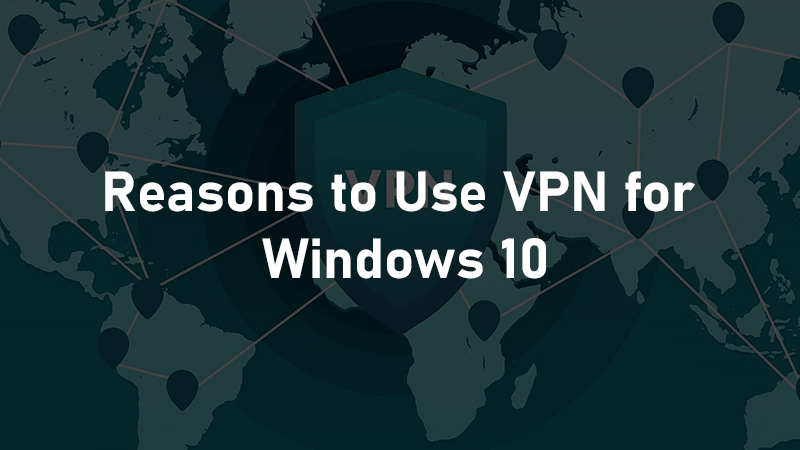
Adopting a VPN for personal computer use, whether intermittent or regular, is a great way to protect your files—and, more importantly, your information. Whether you’re a day-to-day Internet-goer, a tech guru or even a college student, a VPN can fortify your digital life while reducing the stress of regular browsing.
Today, most PC owners use Windows 10 to create documents, browse online, download music, play video games, check their email and more. While Windows 10 is quite safe, computer access in general can always be a bit safer. If you’re like most Windows 10 users, one of the best ways to double down on digital safety is by using the same, above-mentioned security tool.
Table of Contents
What is a VPN, Anyway?
A VPN is a Virtual Private Network. Typically accessed as a program, and run as a background process, a VPN lets you access Internet networks securely—and anonymously. It connects your personal computer to various online services while hiding your true location—which is vital for defending your PC from targeted digital attacks.
How Does a VPN Work?
When your computer, tablet or smartphone runs a VPN, the device acts as if it’s on the same local network as the one its VPN establishes. Therefore, any incoming network traffic travels over the VPN’s “masked” connection. Likewise, any actions you take online pass along the same connection.
When browsing the Internet through a VPN, your computer contacts each website you visit via an encrypted connection. When this happens, your VPN forwards all network requests for you—then forwarding each website’s return requests through the same connection.
The Biggest Benefits of Using a VPN
Several years ago, many considered VPNs to be tools of overkill—reserved only for tech gurus and Internet users with highly valuable digital data to protect. Nowadays, many people use VPNs—as they’re considered to be standard Internet security tools.
The benefits of using a VPN for personal computer browsing sessions can’t be understated. Even if you benefit from the advanced protection Windows 10 has to offer, your Internet usage can always be safer. Plus, it can always benefit from lessened restrictions.
Browse from Anywhere
Because a VPN acts like it’s a local network, it’s possible to access some local-level network resources from across the globe. In essence: It’s as if your computer were physically present at the VPN network’s location. This means you can benefit from public Wi-Fi services without putting your PC at risk. It also means you can access websites otherwise locked by geo-blocking services.
VPN providers have a slew of international servers to choose from. You can pick which server to use, too, granting you access to multimedia services accessible only in certain areas. Netflix, for example, has country-specific movie lists. Online news media, too, is typically region-specific. A VPN is also useful for circumnavigating some government news restrictions—giving you access to news websites unhindered by local litigation.
Avoid Search Engine Recording
While Bing and Google are excellent search engines, they’re constantly recorded to measure user behavior. This data is normally used by marketers and tech analysts for advertisement purposes, but it’s more than likely that a user’s browsing information can end up somewhere they’d like to avoid.
Search-based data, when used by marketers, is relatively harmless if you’re the only one who uses your Windows 10 experience. If you share your PC, however, any logged search behavior will result in online advertisements which cater to your specific browsing behavior. Because a VPN masks your IP address, it keeps search engines from tracking you. In doing so, it also serves as a preventative targeted ad service.
Protect Your Data
If you tend to browse the Internet on-the-go, your Windows 10 laptop or tablet probably encounters numerous public Wi-Fi networks regularly. Sometimes, a device might “network hop” between these open-door networks—accessing them accidentally, regardless of their safety.
These networks, indeed, tend to not be very safe. Anyone can access them, which means anyone can peruse public networks to collect user data like IP addresses—or even personal information. In a best-case scenario, a run-in with this type of malicious user might result in unwanted spam emails directed at those with exposed IP addresses.
In a worst-case scenario, however, malicious users can extrapolate personal information from the exposed data they access. This means the malicious user might even be able to access the victim’s private accounts via information they obtain.
A VPN’s built-in encryption method removes this possibility entirely—making your browsing experience both anonymous and impossible to exploit.
Getting the Most Out of Your VPN
If you tend to browse the Internet away from home, a VPN is a must-have security addition to your Windows 10 experience. It’ll remove the stress of day-to-day browsing sessions, also safeguarding you from search recording and data logging.
If you use Windows 10 at home, a VPN certainly isn’t a bad choice either. Doing work from home is always better when it’s safer—and an unrestricted Internet experience let’s you enjoy a variety of news sources. To take full advantage of the speed, safety and accessibility your Windows 10 is capable of, keep a high-quality VPN service at your side. You won’t regret it.

